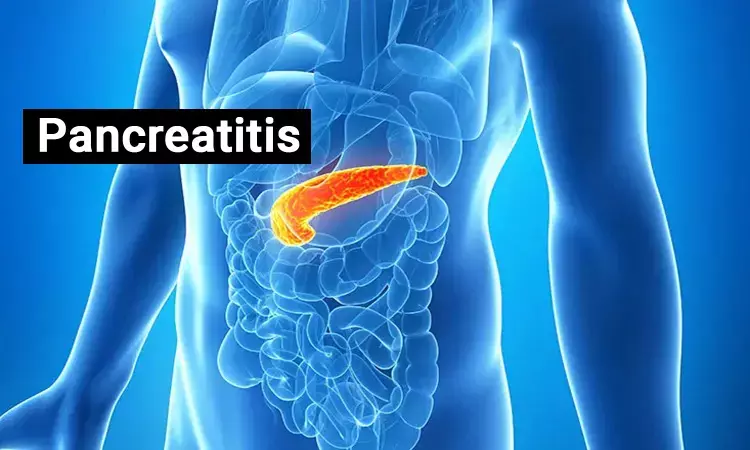- Home
- Medical news & Guidelines
- Anesthesiology
- Cardiology and CTVS
- Critical Care
- Dentistry
- Dermatology
- Diabetes and Endocrinology
- ENT
- Gastroenterology
- Medicine
- Nephrology
- Neurology
- Obstretics-Gynaecology
- Oncology
- Ophthalmology
- Orthopaedics
- Pediatrics-Neonatology
- Psychiatry
- Pulmonology
- Radiology
- Surgery
- Urology
- Laboratory Medicine
- Diet
- Nursing
- Paramedical
- Physiotherapy
- Health news
- Fact Check
- Bone Health Fact Check
- Brain Health Fact Check
- Cancer Related Fact Check
- Child Care Fact Check
- Dental and oral health fact check
- Diabetes and metabolic health fact check
- Diet and Nutrition Fact Check
- Eye and ENT Care Fact Check
- Fitness fact check
- Gut health fact check
- Heart health fact check
- Kidney health fact check
- Medical education fact check
- Men's health fact check
- Respiratory fact check
- Skin and hair care fact check
- Vaccine and Immunization fact check
- Women's health fact check
- AYUSH
- State News
- Andaman and Nicobar Islands
- Andhra Pradesh
- Arunachal Pradesh
- Assam
- Bihar
- Chandigarh
- Chattisgarh
- Dadra and Nagar Haveli
- Daman and Diu
- Delhi
- Goa
- Gujarat
- Haryana
- Himachal Pradesh
- Jammu & Kashmir
- Jharkhand
- Karnataka
- Kerala
- Ladakh
- Lakshadweep
- Madhya Pradesh
- Maharashtra
- Manipur
- Meghalaya
- Mizoram
- Nagaland
- Odisha
- Puducherry
- Punjab
- Rajasthan
- Sikkim
- Tamil Nadu
- Telangana
- Tripura
- Uttar Pradesh
- Uttrakhand
- West Bengal
- Medical Education
- Industry
IM neostigmine reduces IAP in patients with acute pancreatitis and intra-abdominal hypertension

China: Findings from a randomized controlled phase II clinical trial showed that in patients with acute pancreatitis (AP) and intra-abdominal hypertension (IAH), neostigmine reduces intra-abdominal pressure (IAP) and promotes defecation. The study appears in the BMC journal Critical Care.
Acute pancreatitis is a common disease of the digestive system. Severe AP (SAP) with persistent organ failure is related to an increased death risk. According to the World Society for Abdominal Compartment Syndrome (WSACS), IAH is defined as a persistent increase in IAP ≥ 12 mmHg. IAH is considered to be an early risk factor in SAP development. And, IAH in AP is associated with deterioration in organ function.
Against the above background, Nonghua Lu, First Affiliated Hospital of Nanchang University, Nanchang, China, and colleagues aimed to assess the efficacy of neostigmine for IAH in patients with AP in a single-center, two-armed, parallel-group, superiority, randomized controlled phase II clinical trial.
The trial, conducted between September 2015 and August 2017 in the Pancreatic Intensive Care Unit (ICU) of the Department of Gastroenterology at the First Affiliated Hospital of Nanchang University. Consenting patients with IAH within 2 weeks of AP onset received conventional treatment for 24 h. Patients with IAP ≥ 12 mmHg were randomized to receive intramuscular neostigmine (1 mg every 12 h increased to every 8 h or every 6 h, depending on response) or continue conventional treatment for 7 days. Percent change of IAP at 24 h after randomization was the primary outcome.
Following were the study's key results:
· A total of 80 patients were recruited to neostigmine (n = 40) or conventional treatment (n = 40).
· There was no significant difference in baseline parameters.
· The rate of decrease in IAP was significantly faster in the neostigmine group compared to the conventional group by 24 h (median with 25th–75th percentile: −18.7% vs. − 5.4%). This effect was more pronounced in patients with baseline IAP ≥ 15 mmHg.
· Per-protocol analysis confirmed these results.
· Stool volume was consistently higher in the neostigmine group during the 7-day observational period.
· Other secondary outcomes were not significantly different between neostigmine and conventional treatment groups.
The researchers conclude, preliminary study found that neostigmine reduced IAP effectively in patients with AP and IAH who were non-responders to conventional treatment, by enhancing intestinal peristalsis and promoting defecation, especially in those with baseline IAP > 15 mmHg.
They further add that, "these results warrant a larger, multi-center, phase III trial designed for assessing the impact of neostigmine on the complications of AP from multiple etiologies."
Reference:
He, W., Chen, P., Lei, Y. et al. Randomized controlled trial: neostigmine for intra-abdominal hypertension in acute pancreatitis. Crit Care 26, 52 (2022). https://doi.org/10.1186/s13054-022-03922-4
KEYWORDS: Critical Care journal, neostigmine, acute pancreatitis, intra-abdominal hypertension, acute compartment syndrome, intra-abdominal pressure, Nonghua Lu, organ failure, pancreatitis, defecation, peristalsis
Dr Kamal Kant Kohli-MBBS, DTCD- a chest specialist with more than 30 years of practice and a flair for writing clinical articles, Dr Kamal Kant Kohli joined Medical Dialogues as a Chief Editor of Medical News. Besides writing articles, as an editor, he proofreads and verifies all the medical content published on Medical Dialogues including those coming from journals, studies,medical conferences,guidelines etc. Email: drkohli@medicaldialogues.in. Contact no. 011-43720751


